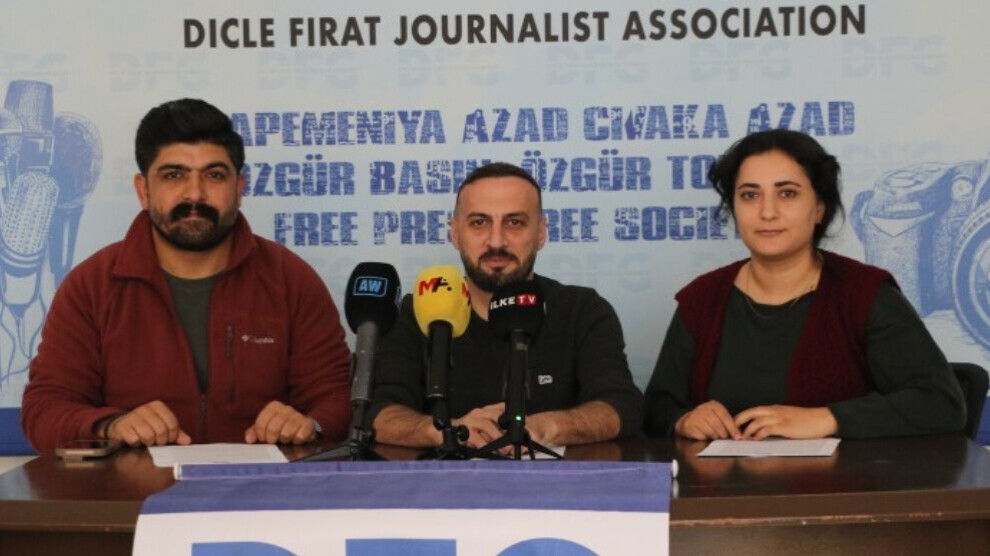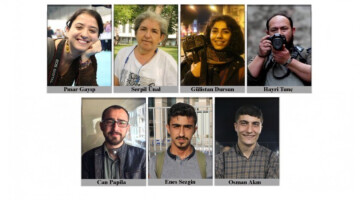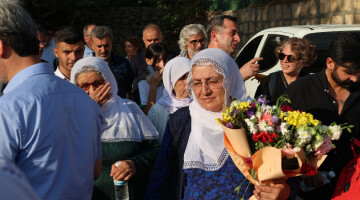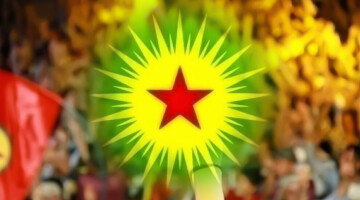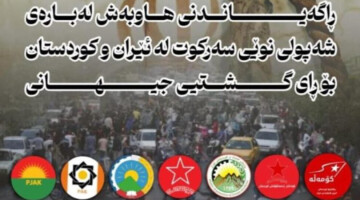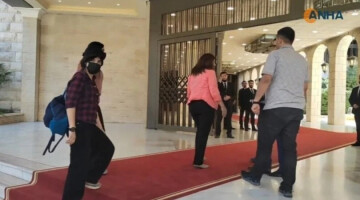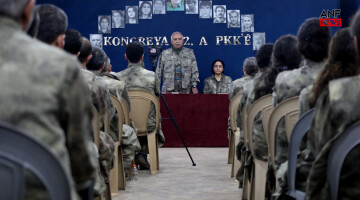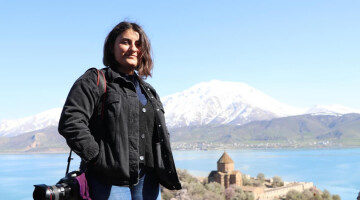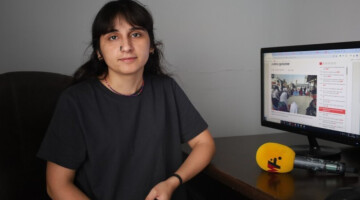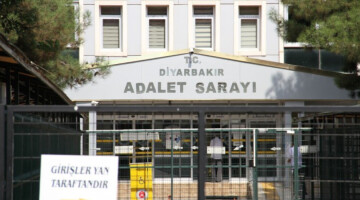The Dicle Fırat Journalists' Association (DFG) based in Amed (tr: Diyarbakır) announced its report on rights violations against journalists in Turkey in 2024.
The press conference of the DFG, which also celebrated its 5th anniversary, was attended by the Mesopotamia Women Journalists Association (MKG), DİSK Basın-İş (Revolutionary Workers' Confederation of Turkey - Press) and journalists.
DFG Co-President Selman Çiçek stated that they have provided legal support to many journalists and will continue to do so. He also commemorated the slain journalists.
The report was read by DFG member Bilal Güldem in Kurdish and by Executive Board member Medine Mamedoğlu in Turkish.
Medine Mamedoğlu stated that DFG has been fighting against injustice and oppression against journalists since the day it was founded and said, “Dicle Fırat Journalists Association has become a reference organisation in the field of journalism with the important work it has done in the past 5 years. We have been able to reach out to many of our colleagues both professionally and legally. On this occasion, we would like to express our thanks once again to our executives and members who have contributed to these efforts and to all our friends who have supported us, and we celebrate the foundation of DFG.”
118 detained, 26 remanded in custody
Medine Mamedoğlu pointed out that 2024 was marked by pressure and bans on the profession of journalism as well as the press and broadcasting institutions: “In the first two months of the year, operations were carried out against journalists in Izmir and Istanbul and many of our colleagues were detained, showing us that the government would never take its hands off journalists. And that is indeed what happened. In February, 8 journalists were detained in Izmir; in April, 9 journalists were detained in Istanbul right after the Kurdish Journalists' Day; in November, 14 journalists, mostly freelancers, were detained just for reporting news and receiving royalties in return for their reports; and in December, 41 journalists were detained in Van and Istanbul while protesting the killing of their colleagues (Nazım Daştan and Cihan Bilgin in Northern Syria). In total, 118 journalists were detained in 2024 and 26 of them were remanded in custody.”
Violence, trial, imprisonment…
Violence against journalists continued throughout the year, said Medine Mamedoğlu and listed the violations of rights as follows: “While 91 of our colleagues were prevented from reporting, 62 of them were subjected to ill-treatment. 47 journalists were attacked and 79 were threatened. While investigations were conducted against 74 journalists, the investigations of 55 of them turned into lawsuits. Journalists were put on trial in 442 cases, and 67 of them were sentenced to a total of 149 years and 9 months in prison. With the imprisonment of 7 journalists for carrying the photographs of Cihan Bilgin and Nazım Daştan in Istanbul, the number of journalists behind bars in Turkey reached 43.
As pressures and violations against journalism continued, the government went on to take action to pass the so-called “agents of influence” draft law with the 9th judicial package. Journalism has been once again clamped down by this draft law which seeks to prosecute and imprison any journalist who conveys information that might disturb the power elites and the government. Of course, this article would not only cover journalists; anyone who shares ideas or information on digital media platforms could also be prosecuted under this article. While professional organisations and the public confronted this article and prevented it from being legislated, the AKP government renamed it the ‘Espionage Law’ and reintroduced it to the Parliament. Faced with the resistance of professional organisations once again, the government took a step back.
Journalists killed by Turkey
Mamedoğlu stated that the AKP-MHP government's attacks on freedom of expression and freedom of thought exceeded the borders of Turkey and targeted Kurdish journalists carrying out journalistic activities in other countries. She noted that the Turkish government carried its war against Kurds to the Federal Kurdistan Region, where it pursued a comprehensive repression policy against journalists with its partner, the ruling KDP.
Mamedoğlu listed the AKP’s and KDP’s attacks against Kurdish journalists as follows:
On 8 July, a Turkish combat drone struck the vehicle of journalists in Shengal (Sinjar). While ÇIRA FM Reporter Mirad Mîrza lost his life, ÇIRA TV Reporter Medya Hasan and the driver, Xelef Xidir, were wounded.
On 11 July, KDP forces detained Zoom Media reporter Hejîn Fetah, a cameraman and the driver accompanying them.
On 14 July, photographer Murat Yazar, who had travelled to the Kurdistan Region to take photographs, was detained by KDP Asayish (Internal Security Forces) in Zakho.
On 23 July, Sulaymaniyah Asayish detained Rojnews reporter Dêrin Rehîm and confiscated his equipment.
On 23 August, Turkey bombed a civilian vehicle in Sayyid Sadiq near Sulaymaniyah. Journalists Hêro Bahadîn and Gülistan Tara, who were travelling in the car, were killed.
On 19 December, a vehicle with the ‘Press’ inscription was bombed by a Turkish combat drone in the Tishrin region in North-East Syria. Journalists Nazım Daştan and Cihan Bilgin lost their lives.
Thousands of access bans
The report pointed out that censorship policies have turned into an instrument of punishment through BİK (Press Advertisement Agency), RTÜK (Radio and Television Supreme Council) and court decisions. Freedom of the press and freedom of expression took a severe turn with access bans, confiscations and suspensions. In this context, 501 websites were shut down in 2024 and access to 5,260 news items was banned. In the last three months of the year, a decision was made for 50 newspapers and magazines to be pulled off the shelf.
Online media also received its share of the access bans. Instagram, which has millions of users, was shut down on the second day of August. Again, websites representing the free press tradition, such as the Mesopotamia Agency and Yeni Yaşam newspaper, faced access bans several times. 1,092 online media content was blocked in 2024.
The truth cannot be blacked out
Medine Mamedoğlu stated that journalists also confronted the attacks despite all the obstacles they faced, including censorship, obstruction of reporting, arrests and pressure on the press and media organs: “Although the murder of Gülistan Tara, Hêro Bahadîn, Cihan Bilgin and Nazım Daştan was intended to silence the free press, a strong spirit of solidarity emerged, and a united struggle was waged against the attacks. In the face of these attacks, honourable journalists, especially those working for the free press, showed that the truth cannot be blacked out, keeping their pen and camera on the side of the truth. As we have been saying since the day we were founded, we will continue to advocate for ‘Free press, free society’.”

